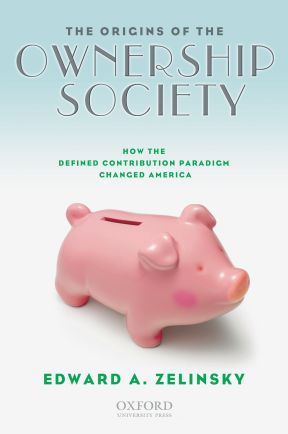Edward A. Zelinsky is the Morris and Annie Trachman Professor of Law at the Benjamin N. Cardozo School of Law of Yeshiva University. He is the author of The Origins of the Ownership Society: How The Defined Contribution Paradigm Changed America. In this article, Professor Zelinsky criticizes New York’s “convenience of the employer” doctrine for double taxing telecommuters at a time when public policy should be encouraging, rather than hindering, telecommuting. He calls on Congress to pass the Telecommuter Tax Fairness Act to stop such double taxation. Read his past OUPblog posts here.
A gallon of gas today costs $4.00 or more in most parts of the country. The public is concerned, as perhaps never before, about the impact of human activity on the global environment. In this setting, telecommuting has emerged as an environmentally sensitive and economically sensible lifestyle.
By permitting individuals to work at home for part (often much) of the work week, telecommuting removes telecommuters’ cars from the roads, thereby reducing traffic congestion, gas consumption, and automotive pollution. Telecommuting from home also opens job opportunities for persons for whom a conventional, daily trip to the work place is difficult or undesirable – parents’ of small children, disabled individuals, persons who live far from major employment centers. Telecommuting allows employers to hire these individuals who might otherwise withdraw from the labor force.
of the work week, telecommuting removes telecommuters’ cars from the roads, thereby reducing traffic congestion, gas consumption, and automotive pollution. Telecommuting from home also opens job opportunities for persons for whom a conventional, daily trip to the work place is difficult or undesirable – parents’ of small children, disabled individuals, persons who live far from major employment centers. Telecommuting allows employers to hire these individuals who might otherwise withdraw from the labor force.
For all of these reasons, public policy should encourage, or at least not hinder, the growth of telecommuting. Unfortunately, the tax policies of the State of New York discourage telecommuting by double taxing out-of-state individuals who telecommute for New York employers from their out-of-state homes. In particular, New York’s so-called “convenience of the employer” rule imposes nonresident New York income taxes on out-of-state telecommuters on the days they work at home, often hundreds – if not thousands – of miles from New York.
Consider, for example, the recent case of Mr. R. Michael Holt, a human resources compensation consultant who lives in Naples, Florida. In 1999, Mr. Holt worked at his home in Florida for the New York offices of KPMG, LLP and William M. Mercer, Inc. Under the employer convenience rule, New York imposed nonresident income taxes upon Mr. Holt for the income he earned working at home in the Sunshine State, thousands of miles from New York.
When the state in which a telecommuter lives also imposes an income tax, the result of New York’s tax policy is double taxation as the out-of-state telecommuter who works at home must pay tax both to New York and to the state in which she lives. The result is an unfair and inefficient tax penalty for telecommuting, namely, the double taxation of the income earned by the telecommuter on the days she works at her out-of-state home.
New York’s policy is bad, not only for out-of-state persons who telecommute to the Empire State, but potentially for telecommuters throughout the nation and for the employers who employ such telecommuters. If New York can get away with double taxing out-of-state telecommuters, other states will be tempted to emulate New York and likewise tax nonresident telecommuters who work at their out-of-state homes. The upshot will thus be double taxation of telecommuters nationwide when public policy should instead be supporting telecommuting.
Unfortunately, New York’s courts have refused to stop New York’s double taxation of nonresident telecommuters on the days such telecommuters work at their out-of-state homes. In Huckaby v. Tax Appeals Tribunal, New York’s highest court, by a narrow but decisive margin of 4-3, upheld New York’s income taxation of Thomas Huckaby on the days Mr. Huckaby worked at his home in Nashville, Tennessee.
Pending in Congress is legislation which would prevent New York and other states from using the “convenience of the employer” doctrine or any similar artifice to double tax nonresident telecommuters on the days they work at their out-of-state homes. The Telecommuter Tax Fairness Act has attracted bi-partisan support from members of Congress who recognize the importance of telecommuting-friendly public policy.
It is unreasonable for New York to punish telecommuting by double taxing workers who telecommute for New York employers from their out-of-state homes, particularly at a time when sound public policy should encourage telecommuting. There is, however, no sign that New York will alter its irrational “convenience of the employer” rule. Congress should accordingly adopt the Telecommuter Tax Fairness Act to eliminate the ability of New York and other states to double tax nonresident telecommuters on the days they work at their out-of-state homes.



